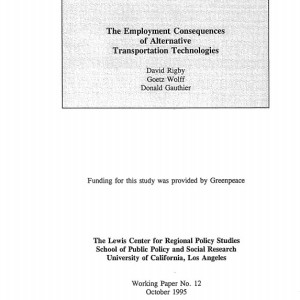
Authors: David Rigby, Goetz Wolff, Donald Gauthier
Date: October 1, 1995
Project: [wpv-post-link id=”$project”]
This report evaluates the employment impact of hypothesized shifts to alternative transportation systems, i.e., the trade-off between jobs and clean transportation. The results of the study show that the direct and indirect employment effects of shifting to alternative automotive technologies vary according to which technology is considered: the electric car, the super fuel-efficient vehicle, the hybrid, the alternate fuel vehicle (such as ethanol, methanol, propane, and methane gas), or mass transit systems.
Our optimistic findings about the employment generation potential of mass transit, and the potential of maintaining current employment levels with alternative automotive technologies, must be understood within the context of these larger structural trends. Transportation planners at UCLA suggest that the most viable future transportation systems would incorporate a variety of mass transit systems, such as carpools, vanpools, shared ride taxis, jitney services, local buses and employer operated buspools. Buses are less expensive than rail systems, and because they are more operations-intensive, rather than capital-intensive, they generate more employment.